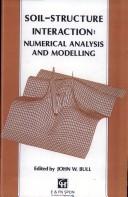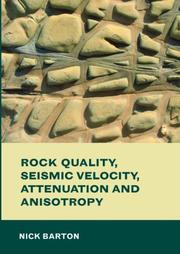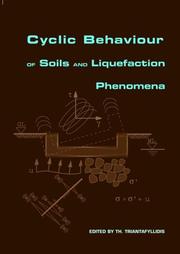| Listing 1 - 10 of 60 | << page >> |
Sort by
|
Book
ISBN: 3931396304 3931396312 3931396320 Year: 1998 Publisher: Darmstadt : Institute and laboratory of geotechnics,
Abstract | Keywords | Export | Availability | Bookmark
 Loading...
Loading...Choose an application
- Reference Manager
- EndNote
- RefWorks (Direct export to RefWorks)
Book
Abstract | Keywords | Export | Availability | Bookmark
 Loading...
Loading...Choose an application
- Reference Manager
- EndNote
- RefWorks (Direct export to RefWorks)
Book
Year: 2014 Publisher: Washington, District of Columbia : IOS Press,
Abstract | Keywords | Export | Availability | Bookmark
 Loading...
Loading...Choose an application
- Reference Manager
- EndNote
- RefWorks (Direct export to RefWorks)
With construction techniques becoming ever more complex, and population pressure leading to the development of increasingly problematic sites, expertise in the area of soil structure interaction is crucial to architectural and construction industries worldwide.This book contains the proceedings of the ISSMGE Technical Committee 207 International Conference on Geotechnical Engineering - Soil Structure Interaction and Retaining Walls - held in St Petersburg, Russia, in June 2014. The conference was dedicated to the memory of the outstanding geotechnical expert Gregory Porphyryevich Tschebotariof
Book
ISBN: 1536176842 9781536176841 9781536176834 Year: 2020 Publisher: New York
Abstract | Keywords | Export | Availability | Bookmark
 Loading...
Loading...Choose an application
- Reference Manager
- EndNote
- RefWorks (Direct export to RefWorks)
"This edited book provides discussion and presents results related to some "hot topics," all dealing with the soil-structure interaction. The book can be of interest to both scientists involved in academic studies of the problems addressed and for practitioners engaged in high-level design. Chapter I reports the investigation of non-stationary wave propagation in continuously inhomogeneous cylindrical elements (such as pipelines). New results obtained by numerical analysis of non-stationary wave propagation are presented. The cases studied comprise simulations of the propagations of both one-dimensional and two-dimensional non-stationary waves. Waves of the first type are supposed to propagate in continuously inhomogeneous, linearly viscoelastic cylinders, whereas waves of the second type propagate in continuously inhomogeneous elastic cylinders. The authors of this chapter apply an original research method consisting of the implementation of solutions to dynamic problems in the study of elastic and linearly viscoelastic piecewise homogeneous bodies. Chapter II outlines an analytical study of the propagation of different types of waves (plane, cylindrical, spherical) as well as of the waves' interaction with an element of Vibro-isolation (specifically, a three-layer plate). The author also presents the numerical results of the study of the distribution of the vibration accelerations in soil. Chapter III presents details on the analytical modeling of a bearing device for passive seismic isolation (friction-pendulum system). The behavior of the slider is identical to a motion of a particle constrained to slide on a spherical surface. The analytical model includes equations of motion, derived using the Lagrange formalism and constitutive equations of the sliding interface. The author presents the results of the numerical simulation of the response of the bearing device to a seismic event, assuming a constant value of the friction coefficient. Chapter IV proposes a discussion on the assessment of the load-carrying capacity of a metal-resin anchor and the determination of dependencies between parameters of supporting systems that include anchors. The solution to the problems addressed in this study involves an accurate analysis of the load transfer mechanisms between different system components. The proposed strategy requires the implementation of an algorithm aimed at the reconstruction of the analytical form of a function, provided its tabular form is available. The authors also formulate a theorem that postulates the existence of such representation applicable in a more general context. The research object in Chapter V is the formulation of the boundary value problems for circular and annular three-layer plates subjected to axisymmetric loading. The considered plates consist of three layers: two thin bearing layers and one filler layer, with a perfect bond, assumed for all interfaces. The definition of the stress-strain state in the plates presumes that the Kirchhoff's hypotheses regarding the bearing layers and the Timoshenko's hypothesis (i.e., linear distribution of the tangential displacements over the thickness) concerning the filler layer hold. The performed analyses take into account the characteristics of the elastic (Winkler) foundation. The authors provide the obtained analytical solutions to the formulated boun"--

ISBN: 0419190708 9780419190707 Year: 1994 Publisher: London: E & FN Spon,
Abstract | Keywords | Export | Availability | Bookmark
 Loading...
Loading...Choose an application
- Reference Manager
- EndNote
- RefWorks (Direct export to RefWorks)

ISBN: 0415394414 9780415394413 9780203964453 0203964454 Year: 2007 Publisher: London : Taylor & Francis
Abstract | Keywords | Export | Availability | Bookmark
 Loading...
Loading...Choose an application
- Reference Manager
- EndNote
- RefWorks (Direct export to RefWorks)
Cross-disciplinary in nature, this book traces an ever-accelerating path through an important part of the earth sciences, describing seismic behaviour at many scales, and appropriate rock mechanics interpretation, as a means of illuminating and trying to understand what lies beneath the earth's immediate surface. The treatment is deliberately non-mathematical and phenomenological in nature, with a wealth of figures from a wide review of the literature from many earth science fields. The book reviews examples of seismic measurements from various fields and under various conditions. The last chapter highlights deeper, higjer stress and large scale applications.

ISBN: 9789058096203 9058096203 Year: 2004 Publisher: Leiden: A.A. Balkema Publishers,
Abstract | Keywords | Export | Availability | Bookmark
 Loading...
Loading...Choose an application
- Reference Manager
- EndNote
- RefWorks (Direct export to RefWorks)
Book
ISBN: 0306483874 Year: 2004 Publisher: Dordrecht, The Netherlands ; Boston : Kluwer Academic Publishers,
Abstract | Keywords | Export | Availability | Bookmark
 Loading...
Loading...Choose an application
- Reference Manager
- EndNote
- RefWorks (Direct export to RefWorks)
W S HALL School of Computing and Mathematics, University of Teesside, Middlesbrough, TS1 3BA UK G OLIVETO Division of Structural Engineering, Department of Civil and Environmental Engineering, University of Catania, Viale A. Doria 6, 95125 Catania, Italy Soil-Structure Interaction is a challenging multidisciplinary subject which covers several areas of Civil Engineering. Virtually every construction is connected to the ground and the interaction between the artefact and the foundation medium may affect considerably both the superstructure and the foundation soil. The Soil-Structure Interaction problem has become an important feature of Structural Engineering with the advent of massive constructions on soft soils such as nuclear power plants, concrete and earth dams. Buildings, bridges, tunnels and underground structures may also require particular attention to be given to the problems of Soil-Structure Interaction. Dynamic Soil-Structure Interaction is prominent in Earthquake Engineering problems. The complexity of the problem, due also to its multidisciplinary nature and to the fact of having to consider bounded and unbounded media of different mechanical characteristics, requires a numerical treatment for any application of engineering significance. The Boundary Element Method appears to be well suited to solve problems of Soil- Structure Interaction through its ability to discretize only the boundaries of complex and often unbounded geometries. Non-linear problems which often arise in Soil-Structure Interaction may also be treated advantageously by a judicious mix of Boundary and Finite Element discretizations.
Soil-structure interaction. --- Mechanics. --- Boundary element methods
Book
Abstract | Keywords | Export | Availability | Bookmark
 Loading...
Loading...Choose an application
- Reference Manager
- EndNote
- RefWorks (Direct export to RefWorks)
Book
Year: 1975 Publisher: Tucson (AZ) : University of Arizona Press,
Abstract | Keywords | Export | Availability | Bookmark
 Loading...
Loading...Choose an application
- Reference Manager
- EndNote
- RefWorks (Direct export to RefWorks)
| Listing 1 - 10 of 60 | << page >> |
Sort by
|

 Search
Search Feedback
Feedback About UniCat
About UniCat  Help
Help News
News